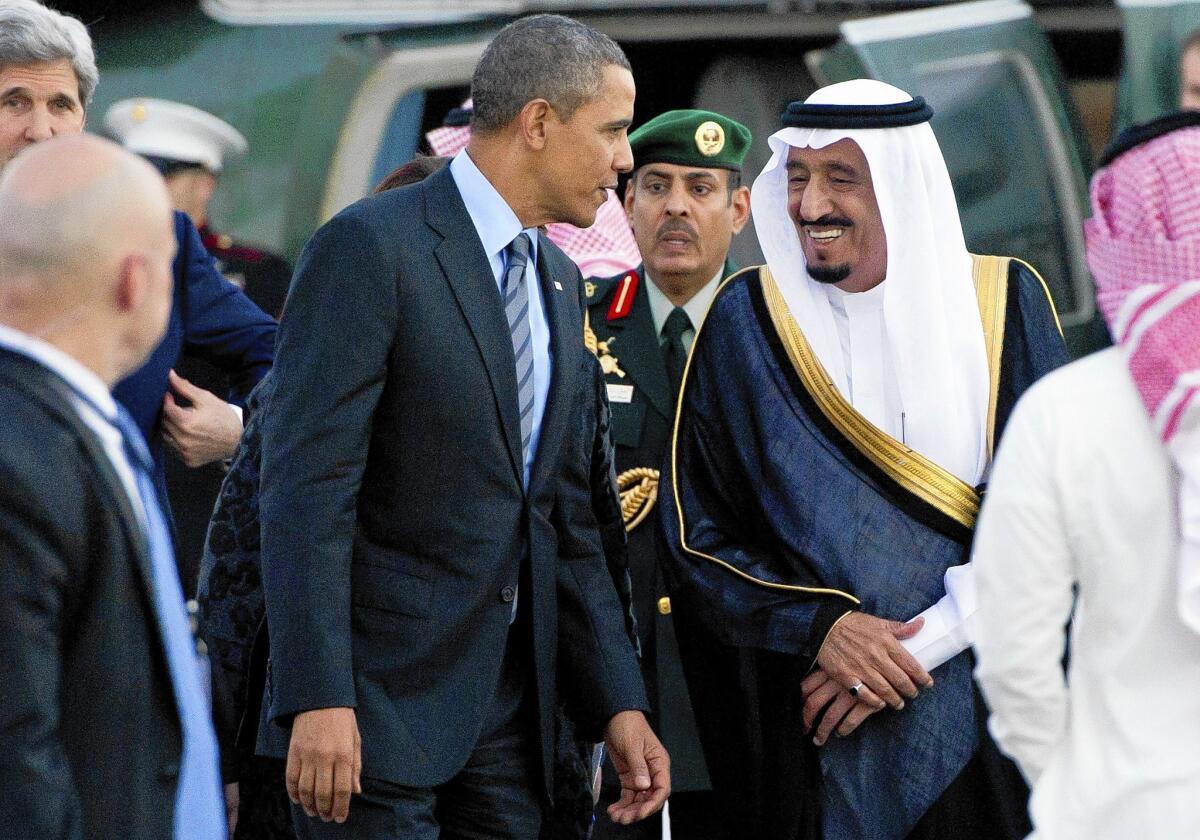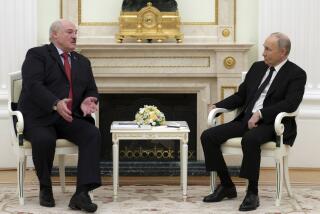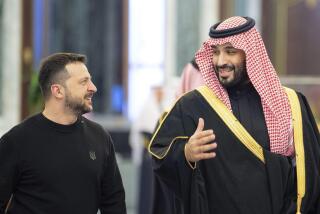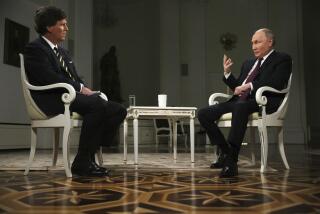Vladimir Putin calls Obama about Ukraine crisis

RIYADH, Saudi Arabia — President Obama spoke with Russian President Vladimir Putin for an hour Friday in an effort to resolve the crisis over Ukraine, the first direct conversation between the two leaders after nearly two weeks of tension.
Putin initiated the call, White House officials said. It came after a televised interview in which Obama called for Russia to pull its troops back from the Ukrainian border. In the phone conversation, Obama asked Putin to “put a concrete response in writing” to a proposal the United States has made to resolve the crisis, which involved Russia’s incursion into the Crimean region of Ukraine.
The two agreed to a meeting between Secretary of State John F. Kerry and Russian Foreign Minister Sergei Lavrov to discuss the proposal further.
The call came as Obama was in Saudi Arabia for a meeting with King Abdullah, where he grappled with another difficult issue: the Saudi desire to have the U.S. provide more arms to rebels fighting the government of Syria. An administration official said Obama was considering allowing the supply of shoulder-held antiaircraft missiles, along with other options.
The missiles would be a potent weapon for the opposition, but the U.S. has resisted providing them, in part out of fear that they could be diverted to terrorist groups that might try to use them against civilian airliners. That is still of concern to the president, another official said.
Obama advisors had described the visit to the desert kingdom as a way for him to reaffirm the U.S. commitment to its longtime ally in the Middle East, but the phone conversation with Putin quickly overshadowed the meeting.
Thus did Obama wrap up a week of foreign travel characterized from start to finish by its herky-jerky agenda. The focus veered widely from talks about Ukraine with Europeans to discussions about Syria, Iran and Egypt on an overnight trip
to Saudi Arabia, where Obama met Abdullah at his desert encampment north of Riyadh, the Saudi capital.
In his interview with CBS News, which was broadcast Friday, Obama drew attention to the Russian troops massed near Ukraine’s borders.
“It may simply be an effort to intimidate Ukraine, or it may be that they’ve got additional plans,” he said. “In either case, what we need right now to resolve and de-escalate the situation would be for Russia to move back those troops and to begin negotiations directly with the Ukrainian government, as well as the international community.”
An administration official described the conversation between Obama and Putin as “frank and direct,” the preferred diplomatic code for contentious and tense.
In the Kremlin’s description of the call, Putin complained to Obama about the “continuing rampage of extremists” in Ukraine who, he said, are intimidating pro-Russian elements “with impunity.” He also complained that the Transnistria region of Moldova, which is seeking annexation to Russia, is suffering under a Ukrainian “blockade.”
Russia wants a “fair and comprehensive” settlement for Transnistria, a tiny slip of territory in eastern Moldova next to Ukraine, and wants to explore steps to “stabilize the situation” in Ukraine, Putin told Obama, according to the Kremlin.
Samuel Charap, a Russia specialist at the International Institute for Strategic Studies in Washington, said the Russian description of the phone conversation suggested there was little reason to hope for a breakthrough.
“They had different agendas; they were really speaking different languages,” he said.
Charap said Putin’s comment about Transnistria was “ominous” because Russia might use such complaints as the basis for further military action in Ukraine. And he noted that Russia would like to negotiate over Ukraine’s future with U.S. officials, but does not recognize the interim Ukrainian government.
In the White House account, Obama emphasized to his Russian counterpart that the U.S. continues to support a diplomatic path that includes close consultation with the new Ukrainian leaders.
U.S. officials declined to describe the proposal that Kerry and Lavrov will discuss, but said the two diplomats had been working to reach an agreement to de-escalate the situation. However, they said it could include international monitors, a Russian troop pull-back and direct Russia-Ukraine negotiations.
Obama arrived in Riyadh intent on focusing on soothing Saudi concern about various issues. Syria and Iran dominated the meeting, a senior administration official said.
By day’s end, though, the Saudi king had gotten the glimmer of a promise that Obama would weigh backing off his objection to arming Syrian rebels with man-operated portable air defense systems — “manpads,” in military jargon.
An administration official said the president continues to be concerned about the possibility of such weapons falling into terrorists’ hands. Supplying the small antiaircraft missiles is one of several options for bolstering assistance that has been under review, as the White House looks to broaden its coordination with allies in the region.
That Obama flew thousands of miles for a two-hour sit-down with the frail king speaks to the importance of the relationship. Officials said the president wanted to speak directly to the king, with whom he hasn’t met formally since 2010.
There’s no replacement for having the president “sit and patiently and carefully walk him through what we’re doing and what the objective is,” the official said.
History supports Obama’s caution about antiaircraft weapons, said Gordon Adams, professor of international relations at American University and a former national security official in the Clinton White House.
“We gave them to the Pashtuns in Pakistan, and they took them into Afghanistan and they disappeared into the hands of extremists,” Adams said.
Obama’s foreign policy challenges have a common theme, Adams said.
“Both here and in the Russian case, we’re seeing a fairly careful consideration of the ladder of escalation. The administration is looking very carefully at the steps before it moves up the ladder in dealing with confrontation with another country. They’re being very careful because they have to be.”
kathleen.hennessey@latimes.com
Hennessey reported from Riyadh and Rawdat Khuraim, Saudi Arabia, and Parsons from Washington. Times staff writers Neela Banerjee and Paul Richter in Washington contributed to this report.
in Washington contributed to this report.
More to Read
Start your day right
Sign up for Essential California for news, features and recommendations from the L.A. Times and beyond in your inbox six days a week.
You may occasionally receive promotional content from the Los Angeles Times.








